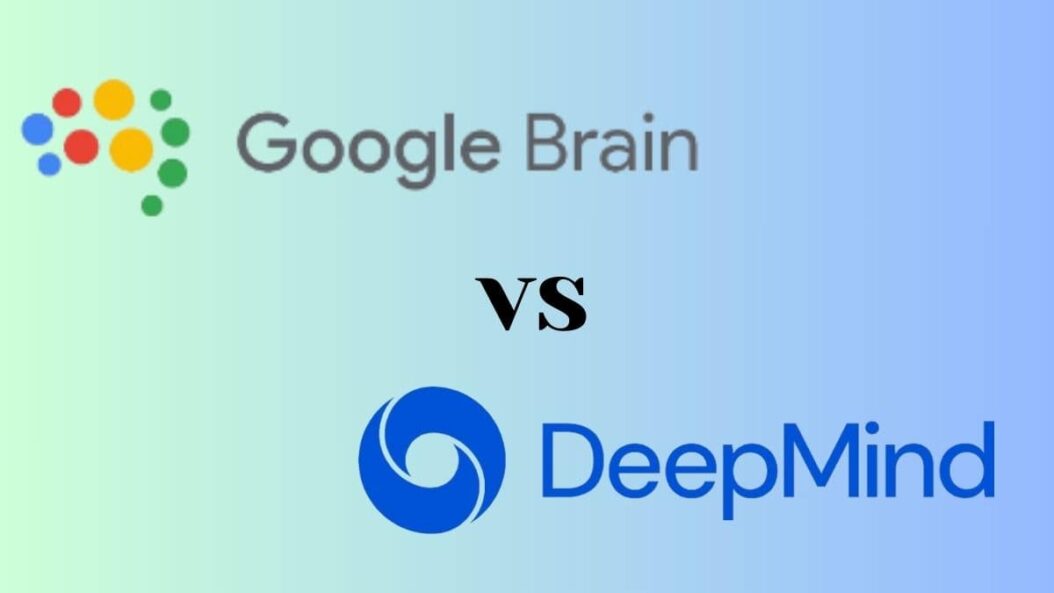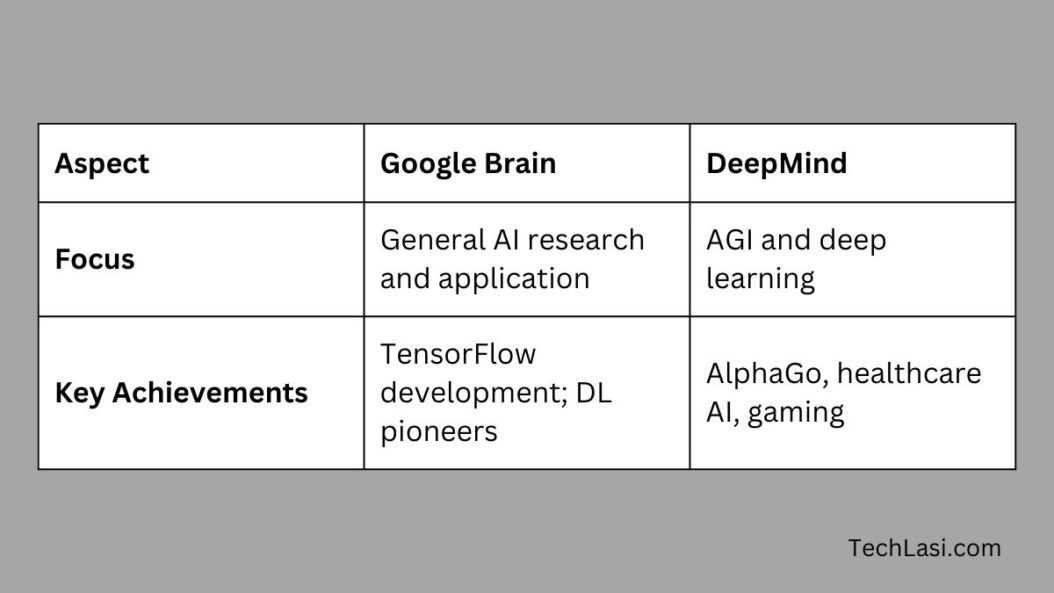Google and DeepMind are two of the leading technology companies pushing the boundaries of artificial intelligence (AI) research and development. Both Google Brain and DeepMind have produced groundbreaking innovations in areas like computer vision, natural language processing, robotics, and more. However, there are some key differences between the two organizations’ approaches to developing advanced AI systems.

Google Brain’s Focus on General Intelligence
Google Brain was founded in 2011 to be the AI division within Google and Alphabet dedicated to conducting open-ended research into machine learning and neural networks. A key focus area for Google Brain is working towards artificial general intelligence (AGI) – AI systems with more human-like, flexible intelligence that can learn a variety of tasks.
Pushing AI Capabilities Through Fundamental Research
Google Brain aims to produce AI breakthroughs through long-term, fundamental research into core areas like unsupervised learning, deep learning theory, reinforcement learning, and multimodal perception. Their approach is focused on innovating AI algorithms and architectures that can serve as general purpose tools to expand what current AI systems are capable of.
Applications Across Multiple Domains
While much of Google Brain’s research is theoretical, they do apply their advancements across many real-world domains. This includes using AI for healthcare, robotics, accessibility tools, sustainability efforts, and much more. The overarching goal is to solve difficult intelligence challenges that can benefit multiple areas.
DeepMind’s Mission to Solve Intelligence
Founded in 2010 and acquired by Google in 2014, DeepMind shares Google Brain’s passion for pushing AI capabilities further. However, DeepMind has carved out a differentiated mission centered around building safe artificial general intelligence.
Ethics-Focused Path to AGI
DeepMind aims to take an ethics-first approach to developing human-level AGI, ensuring these systems remain under human control and benefit society. This guides their strategy towards AGI focused on transparency, privacy preservation, and safe application of advanced algorithms.
Specialization in Games and Simulations
To work towards AGI in a controlled, iterative manner, DeepMind conducts much of its research using games, simulations, and virtual environments. Mastering games/simulations requires general learning algorithms powerful enough to tackle more real-world complexities.
Starcraft and AlphaFold Successes
Two high-profile examples include DeepMind’s AlphaStar system defeating pro gamers at complex strategy game Starcraft, and AlphaFold significantly improving protein folding predictions – winning biology’s 50-year Protein Folding challenge.
Similar Yet Distinct Approaches
While Google Brain and DeepMind push AI capabilities forward in their own way, they share a few commonalities:
Publish Cutting-Edge Research
Both openly publish many research papers documenting their latest innovations in machine learning and AI, advancing public understanding.
Attract Top AI Talent
Each has attracted many leading AI researchers and interdisciplinary experts in computing and neuroscience to drive advancements.
Provide AI Resources
They provide access to resources like datasets, frameworks, and computing tools to empower broader AI research efforts.
Retain Independence
Although owned by Google/Alphabet, both retain considerable independence to uphold academic freedom guiding open research directions.
Key Differences Between Strategies
However, there are some distinctions between Google Brain’s and DeepMind’s visions for achieving advanced general intelligence:

Application Scope
Google Brain aims for research applicable to many societal domains directly. DeepMind utilizes games/simulations to build towards safe, real-world AGI.
Timelines
Google Brain conducts open-ended fundamental research with no defined end target. DeepMind works iteratively toward their formal AGI vision on an ethics-focused, stepwise roadmap.
Commercial Viability
Google Brain focuses less on near-term commercial products, while DeepMind also bridges their innovations towards practical tools for current complex problem solving.
Industry Partnerships
Google Brain collborates often with external researchers. DeepMind retains more research independence but partners selectively with external bodies on aligning ethics and specific projects.
Assessing the Leaders in AI Innovation
Given differing strategies, there are various factors to assess leadership in pushing AI forward responsibly:
Research Output Volume
Sheer volume of research output and breakthrough innovations achieved to date likely favors Google Brain thus far based on resources and reach.
Application Impact
DeepMind has produced some AI firsts with notable real-world utility, though Google Brain spans more domains currently.
Forward Vision
DeepMind lays out a clearly defined developmental roadmap for safe AGI reflecting long term priorities. Google Brain moves fast to unlock AI potential generally.
Ethics Integration
DeepMind has a vigorous ethical code guiding AGI safety. Google Brain does consider ethics but research neutrality is also valued.
Future Societal Benefit
Both play an important role – DeepMind aims for highly impactful future outcomes, while Google Brain steadily accumulates broad progress.
The Outlook for AI Development
AI capabilities from both Google Brain and DeepMind will continue rapidly advancing in coming years through friendly rivalry and collaboration opportunities.
Supportingeach Other’s Progress
There are already examples of Google researchers publishing together or benefiting from each other’s publicly shared methodologies.
Competing to Control Key Milestones
However, both entities are highly invested in their research strategies and will aggressively compete to produce pivotal achievements advancing core objectives like achieving AGI safely first.
Balancing Cooperation and Secrecy
Therefore, while publicly supporting general AI development, secrecy around key research directions will also persist to retain competitive advantages towards milestones.
The Future is Bright and Uncertain
The future is highly promising given how far pioneering efforts from these technology leaders have brought AI already. But competition also carries risks if key safety challenges around increasingly capable AI systems are not addressed proactively by researchers globally.
Conclusion
In summary, Google Brain prioritizes open fundamental research towards general intelligence across many disciplines, while DeepMind strategically progresses along an ethics-focused path targeting safe artificial general intelligence through games and incremental simulations. Both play leading roles advancing cutting-edge machine learning – but strategy differences can also yield alternative real-world outcomes. As these highly capable entities steadily unlock greater AI potential for humanity’s benefit, they must also continue engaging openly around addressing emerging risks and alignment challenges. Maintaining public trust throughout AI transformations entails profound responsibility along the development journey ahead.
FAQs
What is the primary difference between Google Brain and DeepMind?
The key difference is that DeepMind has a clearly defined developmental roadmap for achieving safe AGI, while Google Brain focuses more broadly on open-ended research to push fundamental AI capabilities across different domains.
Which organization currently has the greatest real-world impact with its AI innovations?
Based on some highly ambitious successes like besting champions at games like Go or solving complex protein folding challenges, DeepMind may currently lead in terms of impactful innovations. However, Google Brain applies AI across many different real use cases too.
What milestone could put either entity far ahead competitively in future?
A pivotal milestone would be reaching artificial general intelligence first in a clearly safe, controlled, and ethical manner. However, continual research progress will likely advance both their capabilities over time through parallel innovations.
How might Google Brain and Deep Mind need to collaborate more in future?
As AI systems become more autonomous, continued cooperation around alignment, ethics and interpreting increasingly complex learned behaviors will become critical to ensure safety and prevent uncontrolled development issues.
Do commercial pressures affect their fundamental research directions?
While independently operated, the reality is both exist within larger corporate parents, so commercial forces likely play some role over time – the extent may determine impacts on open, fundamental research over longer timeframes.
- How to Use and Access Claude 3: Pricing, Features, and Everything You Need to Know - March 5, 2024
- How AI is Revolutionizing Strategy Analysis? 2024 - March 1, 2024
- How AI is Transforming the Business of Advertising? - March 1, 2024
